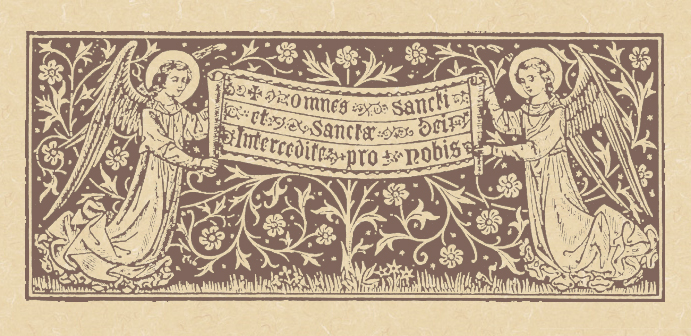It's Never Too Late.
The Nineteenth Monday of Ordinary Time; or, the Memorial of Saint Jane Frances de Chantal, Religious.
Lessons from the primary feria, according to the ordinary form of the Roman Rite:
• Deuteronomy 10: 12-22.
• Psalm 147: 12-15, 19-20.
• Matthew 17: 22-27.
|
When a Mass for the memorial is taken, lessons from the feria as above, or, from the proper:
• Proverbs 31: 10-13, 19-20, 30-31.
• Psalm 131: 1-3.
• Mark 3: 31-35.
…or, any lessons from the common of Holy Men & Women.
|
The Third Class Feast of Saint Clare, Virgin.*
Lessons from the common "Dilexísti…" of a Virgin not a Martyr, according to the extraordinary form of the Roman Rite:
• II Corinthians 10: 17-18; 11: 1-2.
• Psalm 44: 5, 15-16.
• Matthew 25: 1-13.
FatherVenditti.com
|
 2:37 PM 8/12/2019 — Jane Frances de Chantal is one of those saints that everyone knows of, but very few know very much about. This widowed mother of six children, who died in 1641, after her husband’s death dedicated herself to the sick and the poor, during which time she met Saint Francis de Sales, and under his direction, founded a contemplative community of nuns called the Order of the Visitation. It was a member of this community, Saint Margaret Mary, who, many years later, had visions of our Lord in the manifestation of His Most Sacred Heart, leading to the establishment of that devotion and the feast which celebrates it. 2:37 PM 8/12/2019 — Jane Frances de Chantal is one of those saints that everyone knows of, but very few know very much about. This widowed mother of six children, who died in 1641, after her husband’s death dedicated herself to the sick and the poor, during which time she met Saint Francis de Sales, and under his direction, founded a contemplative community of nuns called the Order of the Visitation. It was a member of this community, Saint Margaret Mary, who, many years later, had visions of our Lord in the manifestation of His Most Sacred Heart, leading to the establishment of that devotion and the feast which celebrates it.
The parish where I grew up in Maryland is named after Jane de Chantal. The parish was founded in 1950; and, before the church had been built, the parish would gather in the chapel of the nearby Visitation Convent for Holy Mass; so, in gratitude, the parish was named after their founder. Before the sisters vacated and the convent was sold to the nearby National Institutes of Health, that convent was one of the oldest in North America, going back almost to colonial times; and, because the Visitation order is a traditional cloistered community, that convent and its chapel had not changed in over a century. I served Mass in that chapel many times. Consistent with most of the Catholic churches of that period, it was decorated mostly with oil paintings rather than statues, and over the  high altar was a massive one depicting Saint Margaret Mary receiving the last of her apparitions of our Lord in the manifestation of His Most Sacred Heart, which hadn't happened too much before that painting was made. That memory from my childhood stuck with me, and I'm sure had a lot to do with my decision to become a priest. high altar was a massive one depicting Saint Margaret Mary receiving the last of her apparitions of our Lord in the manifestation of His Most Sacred Heart, which hadn't happened too much before that painting was made. That memory from my childhood stuck with me, and I'm sure had a lot to do with my decision to become a priest.
So, Jane de Chantal is kind of like a catch-all patron saint for a lot of people: married people, widows and widowers, mothers, nuns, because she was all of the above; and, among other things, her life teaches us it’s never too late to always be on the watch for whatever new vocation or mission our Lord may have in store for us, no matter what our age or history. Her spiritual writings, consisting mostly of letters between her and Saint Francis de Sales, reflect a deep penetration into the inner workings of the soul which could only come from a life of considerable experience.
Providentially, her memorial occurs on this day in which we read of our Blessed Lord paying the Temple Tax. It’s an episode that occurs only in the Gospel of Matthew; and, while there’s probably a lot a clever person could say about this incident, suffice it to say that it shows our Lord being a good Jew, and giving us the example of fulfilling all the obligations of his state in life. Every Jew over the age of twenty was required to pay an annual sum of two drachmas to support the worship of God in the Temple of Jerusalem, even those who didn’t live in Palestine. It wasn’t a lot of money, and our Lord ends up paying it by means of a little miracle. Not only does He pay it, but He pays it for Peter as well. So, not only does He fulfill the obligations of His own state in life, He provides assistance to another to do the same, as should we.
May Saint Jane de Chantal, who lived many different states in life, and all in an exemplary way, intercede for us, that we may meet our obligations with equal merit.

* Clare of Assisi expressed to Saint Francis her desire to consecrate herself to God. Together with him, she became the foundress of the Franciscan Nuns of the Second Order as a cloistered, contemplative community, known today as the "Poor Clares." She governed the mother-house of the order for forty-two years with the title of Abbess, the first and the last in the order to hold that title, dying in 1253.
|

